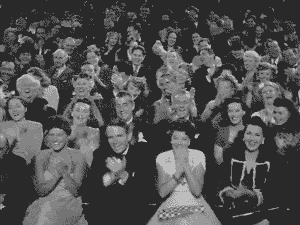19 Saturday  6:00 AM The Private Lives of Elizabeth and Essex
6:00 AM The Private Lives of Elizabeth and Essex (1939)
Elizabeth I's love for the Earl of Essex threatens to destroy her kingdom. Cast: Bette Davis, Errol Flynn, Olivia de Havilland. Dir: Michael Curtiz. BW-106 mins, TV-G, CC
8:00 AM The Court Jester (1956)
A traveling actor is mistaken for a medieval rebel. Cast: Danny Kaye, Glynis Johns, Basil Rathbone. Dir: Norman Panama, Melvin Frank. C-101 mins, TV-G, CC, Letterbox Format
9:52 AM Short Film: Quiet Please (1945)
C-8 mins,
10:00 AM The Secret of the Whistler (1946)
An artist plots murder when his rich wife when she catches him in an affair with one of his models. Cast: Richard Dix, Leslie Brooks, Michael Duane. Dir: George Sherman. BW-64 mins,
11:15 AM The Return of the Whistler (1948)
When a woman goes missing on the eve of her wedding, her fiancee hires a detective to track her down. Cast: Michael Duane, Lenore Aubert, Richard Lane. Dir: D. Ross Lederman. BW-63 mins,
12:30 PM The World's Greatest Athlete (1973)
A washed-up coach saves his career when he discovers a jungle boy who's a natural athlete. Cast: Tim Conway, Jan-Michael Vincent, John Amos. Dir: Robert Scheerer. C-92 mins, TV-PG, CC, Letterbox Format
2:06 PM Short Film: On Location With "Fame" (1980)
C-12 mins,
2:30 PM High Noon (1952)
A retired Marshal must defend his town from a revengeful villain. Cast: Gary Cooper, Grace Kelly, Thomas Mitchell. Dir: Fred Zinnemann. BW-85 mins, TV-PG, CC
4:00 PM The Tin Star (1957)
An experienced bounty hunter helps a young sheriff learn the meaning of his badge. Cast: Henry Fonda, Anthony Perkins, Betsy Palmer. Dir: Anthony Mann. BW-93 mins, TV-PG
5:45 PM Short Film: Things We Can Do Without (1953)
A look at the inconvenience of modern convenience's specifically modern furniture. Cast: Dave O'Brien, Pete Smith Dir: Dave O'Brien BW-9 mins,
5:55 PM Short Film: John Wayne Bio (1962)
BW-4 mins,
6:00 PM Rio Grande (1950)
A cavalry unit located on the Mexican border must control Indian uprisings. Cast: John Wayne, Maureen O'Hara, Ben Johnson. Dir: John Ford. BW-105 mins, TV-PG, CC
What's On Tonight: THE ESSENTIALS: GREER GARSON 8:00 PM Pride And Prejudice (1940)
Jane Austen's comic classic about five sisters out to nab husbands in 19th-century England. Cast: Greer Garson, Laurence Olivier, Edna May Oliver. Dir: Robert Z. Leonard. BW-118 mins, TV-PG, CC, DVS
10:07 PM Short Film: Tyrone Power Biography (1962)
BW-4 mins,
10:15 PM Goodbye Mr. Chips (1939)
A cold-hearted teacher becomes the school favorite when he's thawed by a beautiful young woman. Cast: Robert Donat, Greer Garson, Paul Henreid. Dir: Sam Wood. BW-114 mins, TV-PG, CC, DVS
12:15 AM The Valley Of Decision (1945)
An Irish housemaid's romance with the boss's son is complicated by labor disputes in the Pittsburgh mills. Cast: Greer Garson, Gregory Peck, Lionel Barrymore. Dir: Tay Garnett. BW-119 mins, TV-PG, CC
2:18 AM Short Film: Infantile Paralysis (Greer Garson) (1944)
BW-4 mins,
2:30 AM Random Harvest (1942)
A woman's happiness is threatened when she discovers her husband has been suffering from amnesia. Cast: Greer Garson, Ronald Colman, Susan Peters. Dir: Mervyn LeRoy. BW-127 mins, TV-G, CC
4:45 AM Blossoms In The Dust (1941)
True-life story of Edna Gladney, who fought for orphans' rights in Texas. Cast: Greer Garson, Walter Pidgeon, Marsha Hunt. Dir: Mervyn LeRoy. C-100 mins, TV-G, CC, DVS
